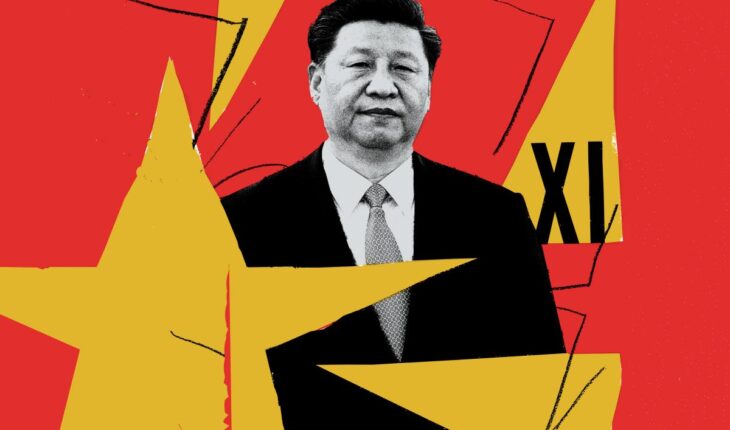Shikha Aggarwal says developments in China’s domestic security landscape reveal systemic fissures
Domestic security constitutes an integral dimension within the strategic-security dynamics of states. However, for authoritarian regimes and political ideologies, where power flows from the barrel of the gun, the concept transcends this traditional role and becomes a tool of both political survival and power for the top leadership. As such, it becomes crucial for authoritarian leaders to exert absolute command over the domestic security apparatus of the state.
It is in this context that the recent downfall, in China, of top security officials on corruption charges and the creation of a new ‘small leading group’ assume significance. At the very outset, they reflect Chinese President Xi Jinping’s perceived vulnerabilities and one of Beijing’s primary socio-political dilemmas.
Targets of anti-graft drive
In addition to sanctioning an aggressive foreign policy posture and military assertiveness in China’s various sovereignty disputes, Mr. Xi announced his post-COVID-19 blitzkrieg at the domestic scene by once again launching an attack on the so-called ‘tigers’ through his anti-corruption campaign. Among others, one of the prominent officials facing corruption charges is the former Vice-Minister of Public Security, Sun Lijun. This makes Sun the third vice-ministerial level official belonging to China’s Ministry of Public Security to have fallen in recent years since the arrests of Meng Hongwei and Li Dongsheng in 2018 and 2016, respectively. Notably, Meng was serving as the president of the Lyon-based Interpol at the time of his arrest.
In addition to his high-profile status, Sun’s arrest is significant as he led the ministry’s First Bureau which deals with the sensitive issues of domestic security and Hong Kong affairs. Other top security officials facing corruption charges are the police chiefs of major provinces such as Shanghai (Gong Daoan) and Chongqing (Deng Huilin).
The arrest of Deng Huilin once again highlights the challenge of Chongqing that Mr. Xi first dealt with in the form of the infamous Bo Xilai scandal which involved an alleged coup attempt against the Chinese President shortly after he had assumed office. Chongqing has become one of the primary targets of the anti-corruption campaign, with several high-ranking officials having fallen under the corruption net over the years.
Challenges from within
The arrests of Meng, Sun and Deng follow Mr. Xi’s struggles with the security establishment that began with the downfall of the former public security czar and Politburo Standing Committee member, Zhou Yongkang back in 2014. Though information remains sketchy, it is widely believed that Sun, Meng and Li were close to Zhou who himself was regarded as a prominent member of the ‘Shanghai Clique’— the powerful faction of the Chinese Communist Party led by its patriarch and former President Jiang Zemin. Analysed from this perspective, Mr. Xi seems to continue to face challenges from the fragments of a faction that had once catapulted him to the helm of China’s politics, but has since then become one of his primary targets in the quest for supremacy.
At one level, these cases serve to highlight the depth of the corruption malice within the Chinese Communist Party; they also point towards the ever-increasing efforts by Mr. Xi to exercise absolute authority over China’s domestic security apparatus; hence, they reveal a possible challenge facing his meticulously crafted and deftly marketed ‘all powerful’ image. In fact, as has been noted by prominent China watchers, a 2015 article (by Xinhua) listed the domestic security forces as one of the 12 most frequently used phrases by Mr. Xi during his first two years in office.
Planned events
Another move that underscores Mr. Xi’s renewed efforts to control the domestic security machinery is the launch of a nationwide campaign to “rectify education” for politicians and law enforcement officials. The aim is to “scrape the poison of the bones” of the country’s political and legal systems under the aegis of the Central Political and Legal Affairs Commission (CPLC), China’s apex body dealing with law enforcement and public security. This campaign will run from next year to the first quarter of 2022. A pilot programme will be tried in select regions between July and October this year. Interestingly, 2022 is the year when the CPC is slated to hold its 20th Party Congress. This will perhaps be one of the most important political events in China’s recent history as it will decide Mr. Xi’s political fate and the continuation of his direct or indirect influence (via an all loyalist politburo) over the country. Additionally, the commission has announced plans to use technological advancements such as blockchain, artificial intelligence and big data to help monitor its police officers and judges.
In conjunction with this campaign, a new body called the Safe China Construction Coordinating Small Group has been established with the CPLC Secretary, Guo Shengkun, serving at its helm. This group has been tasked with tackling the emerging challenges to the country’s social and political stability. It is worth noting that during a Politburo Standing Committee meeting in February, Mr. Xi had characterised the coronavirus pandemic as a major test for China’s governance system, with implications for the country’s social stability.
In fact, these new measures have come amid growing international chorus against China’s policies in Hong Kong, Xinjiang, the South China Sea, and in China’s territorial dispute with India. On the domestic front, Mr. Xi has faced rare public criticism from individuals such as Xu Zhangrun, a (now former) professor at Tsinghua University (incidentally, the President’s alma mater) and fellow ‘princelings’ or the “second generations reds” such as Ren Zhiqiang and Cai Xia. Confronted with an increasingly complex international and domestic scenario, it is no coincidence that Mr. Xi wants to keep a tight rein on the security establishment of the Chinese Party-state.
Shuffling the deck
While these latest moves are to a great extent governed by Mr. Xi’s assessment of China’s (and his own) present vulnerabilities, they nevertheless complement his efforts since assuming power to bring the domestic security front under his supreme control. A key initiative in this regard was the restructuring of the People’s Armed Police (PAP) command structure in 2017-18. Prior to 2018, the PAP had a dual command structure wherein it used to report both to the state Council and the Central Military Commission (CMC). With the restructuring, the PAP now operates under the sole command of the CMC, and thereby its Chairman, Mr. Xi. Furthermore, Mr. Xi has created at least two new institutions to streamline, better integrate and oversee China’s domestic security apparatus in the form of the Central National Security Commission and the National Supervision Commission. These bodies were established in 2013 and 2018, respectively. However, not much information is available regarding the exact nature, role and activities of these institutions.
On closer scrutiny, the recent developments within China’s domestic security landscape may not point towards a significant threat to Mr. Xi’s authority. They nonetheless provide a glimpse into the existing fissures within the Chinese system.
Shikha Aggarwal is a Ministry of Foreign Affairs, Taiwan Fellow at the National Chengchi University






